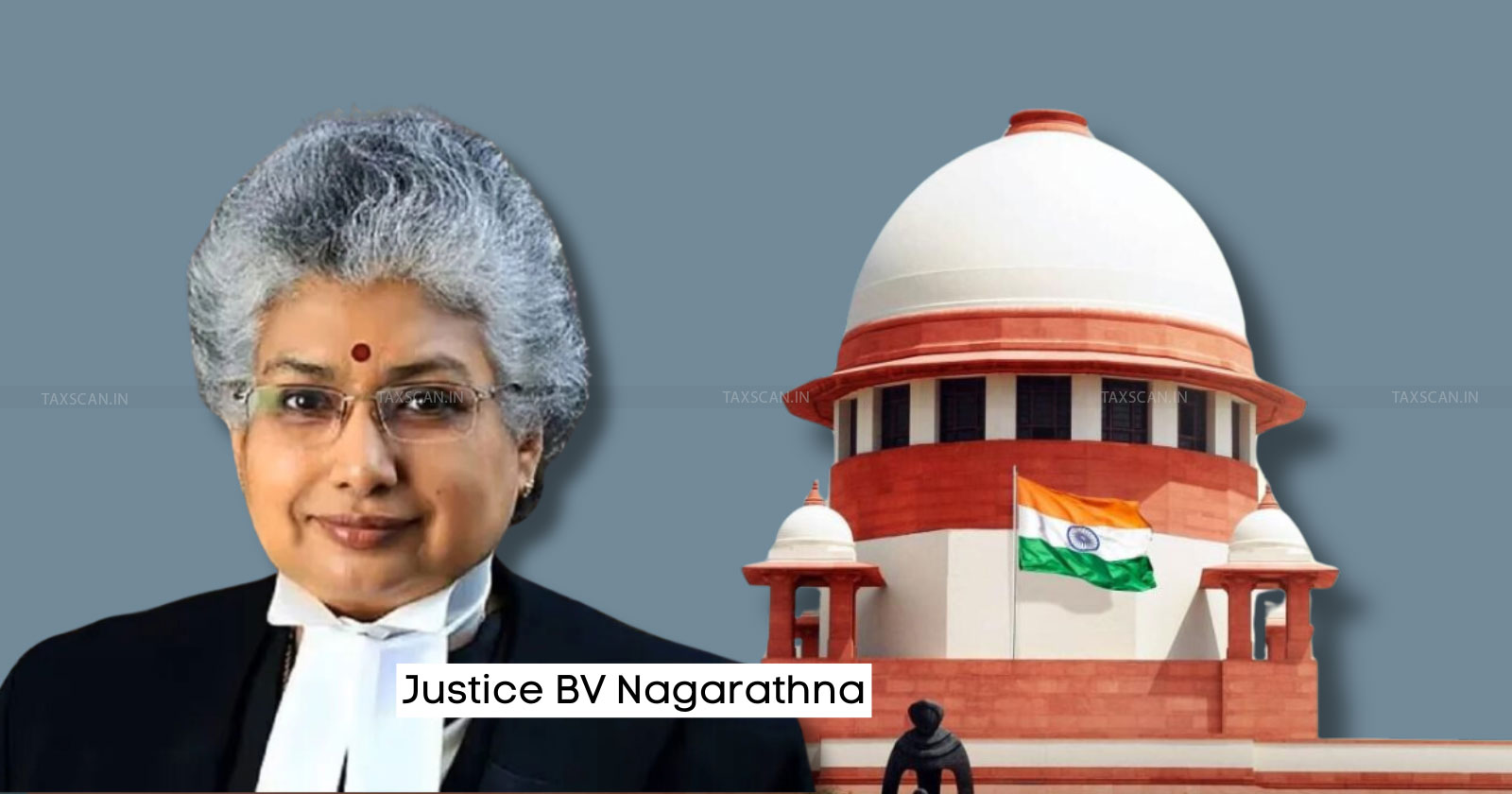States Lack Authority to Regulate Industrial Alcohol: Dissenting Judgement by Supreme Court Justice BV Nagarathna [Read Judgement]
In her dissenting judgement concerning the regulation of industrial alcohol, Justice Nagarathna asserted that allowing both State and Union governments to regulate industrial alcohol would undermine the objective of achieving uniform development across specific industries

Supreme Court – Justice BV Nagarathna – alcohol regulation – alcohol laws in India – taxscan
Supreme Court – Justice BV Nagarathna – alcohol regulation – alcohol laws in India – taxscan
On Wednesday, a nine-judge Bench of the Supreme Court ruled that State governments have the authority to regulate 'industrial alcohol'; however, Justice BV Nagarathna dissented from this opinion.
“Intoxicating liquor” falls within the legislative domain of the State Legislatures under Entry 8 of the State list, List II, of the Seventh Schedule to the Constitution. The issues which arise for adjudication in this reference pertain to the scope of the power of the State Legislatures under Entry 8 and the meaning of the phrase “intoxicating liquor”.
Complete Supreme Court Judgment on GST from 2017 to 2024 with Free E-Book Access, Click here
The question is whether “intoxicating liquor” in Entry 8 only includes potable alcohol, such as alcoholic beverages or also includes alcohol which is used in the production of other products. In Synthetics and Chemicals Ltd. v. State of UP, a seven-Judge Bench delineated the scope of the regulatory powers of State Legislatures on “intoxicating liquor”. The correctness of Synthetics has been referred to the larger bench in reference.
The IDRA, enacted by Parliament, stems from the authority granted under Article 246 in conjunction with Entry 52 of the Union List. Furthermore, denatured alcohol falls within the category of “industrial alcohol,” making Section 18G of the IDRA relevant, as it empowers the Central government to regulate the supply and distribution of articles related to scheduled industries for equitable distribution and pricing.
Complete Supreme Court Judgment on GST from 2017 to 2024 with Free E-Book Access, Click here
Justice Nagarathna, in dissent, emphasised that States cannot legislate on industrial alcohol through Entry 8 of List II (the State List) of the Constitution, as such authority rests solely with the Union government under Entry 52 of the Union List. The key issue for the nine-judge Bench was whether States could regulate industrial alcohol or denatured spirits via Entry 8, which grants powers to manage intoxicating liquors. Entry 52 allows the Central government to oversee industries deemed of public interest by Parliament.
Justice Nagarathna pointed out that industrial alcohol is classified under item 26 (fermentation industries) in the First Schedule of the Industries (Development and Regulation) Act (IDRA). Consequently, she ruled that States should not have the power to legislate on this matter.
Complete Supreme Court Judgment on GST from 2017 to 2024 with Free E-Book Access, Click here
Justice Nagarathna held that Section 18G occupies the field under Entry 33(a) of List III, granting Parliament exclusive authority to legislate on all articles related to scheduled industries, including fermentation industries. In her dissenting opinion, she articulated several points:
- Allowing both State and Union control would hinder the goal of uniform development and lead to disorganised industry growth, negatively impacting the economy.
- Constitutional interpretations should reflect the framers' intentions and the need for consistent industry development across the nation, considering the nature of the Indian economy.
- State legislatures possess legislative authority only over “intoxicating liquors” as beverages. As long as an industry is recognized as a scheduled industry under the IDRA, and Section 18G remains effective, State legislatures are stripped of their regulatory powers.
Complete Supreme Court Judgment on GST from 2017 to 2024 with Free E-Book Access, Click here
- Interference with this legal framework could disrupt other scheduled industries, highlighting their critical role in the Indian economy.
In contrast, the majority opinion from eight judges concluded that State governments can regulate 'industrial alcohol.' They defined 'intoxicating liquor' in Entry 8 of the State List as encompassing a broader range of alcohol, not limited to just alcoholic beverages, thus including industrial alcohol.
The majority included Chief Justice DY Chandrachud and Justices Hrishikesh Roy, Abhay S Oka, JB Pardiwala, Manoj Misra, Ujjal Bhuyan, Satish Chandra Sharma, and Augustine George Masih.
This case was escalated to the nine-judge Constitution Bench on December 8, 2010, following conflicting rulings by earlier benches. The Supreme Court had previously noted in State of UP v Lalta Prasad Vaish that a 1990 ruling in Synthetics & Chemicals Ltd. v. State of Uttar Pradesh had overlooked a significant 1956 decision in Ch. Tika Ramji v State of Uttar Pradesh. Today, the majority judges overruled the Synthetics & Chemicals decision.
Complete Supreme Court Judgment on GST from 2017 to 2024 with Free E-Book Access, Click here
Representatives for the Union government included Attorney General R Venkataramani and Solicitor General Tushar Mehta, with advocates Dinesh Dwivedi for Uttar Pradesh, along with Senior Advocates Arvind Datar, V Giri, Jaideep Gupta, Balbir Singh, and Shadan Farasat supporting the States' power to regulate industrial alcohol.
Justice Nagarathna, in her dissenting view, noted that, In my view, Entry 8 – List II deals with
“intoxicating liquors”. The misuse, diversion or abuse of “industrial alcohol” as “intoxicating liquors” can also be controlled and prevented under Entry 8 – List II by the State Legislatures having regard to Article 47 of the Constitution.
Justice Nagarathna's dissent today is an echo of her recent dissent in another nine-judge Constitution Bench judgement delivered on July 26, concerning States' taxation powers over mining and mineral-use activities.
In that instance, she remarked that only the Union government could levy taxes on minerals and mineral-rich lands, aligning with the Centre's position that granting States this authority would result in double taxation and hinder mineral development in the country.
To Read the full text of the Judgement CLICK HERE
Support our journalism by subscribing to Taxscan premium. Follow us on Telegram for quick updates


